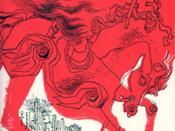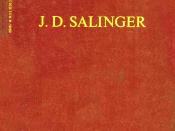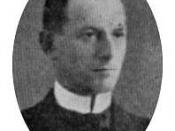Mother Theresa said, "do not judge people, for you will have no time to love them".
One of the most important themes in "The Catcher in the Rye", is the tendency people have to judge one another. The narrator, Holden Caulfield, is not only judgmental of the people he meets, but of society as a whole. Throughout his experiences, he criticizes the phoniness and shallowness that he encounters in the world around him. One sees, that while Holden spends much of his time judging the actions and intentions of others, he never recognizes his own faults.
Throughout the novel, Holden runs into both old and new faces. He almost instantly begins to criticize them, never taking the time to think about their true intentions. An example of this is seen when Holden bids farewell to his history teacher, Mr. Spencer, before leaving Pencey. Mr. Spencer is obviously trying to help Holden, but all Holden can think about is "if the lagoon in Central park would be frozen over when he got home, and if it were, where the ducks would go," (Salinger 13) while at the same time "shooting the bull" (Salinger 12).
He glibly agrees with everything that Spencer says, while internally criticizing his appearance and how he talks. When Holden met with Sally Hayes, he didn't even think twice before thinking she was "quite the little phony" (Salinger 106). Sally seems to genuinely want to be with Holden, but Holden won't let himself believe it. After accusing the theater of being full of phonies, he is so depressed he claims to have "sort of hated old Sally by the time he got in the cab." (Salinger 128) Blinded by his cynical view of people, he can't get close to anyone.
Not only does Holden's judgmental...



Good
Good piece, but I'm unsure if a bibliography was actually necessary on a piece of work such as this
0 out of 0 people found this comment useful.